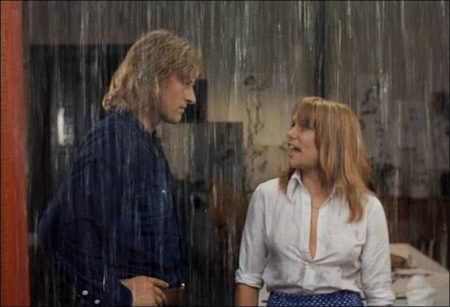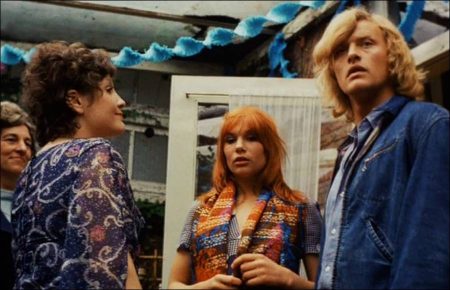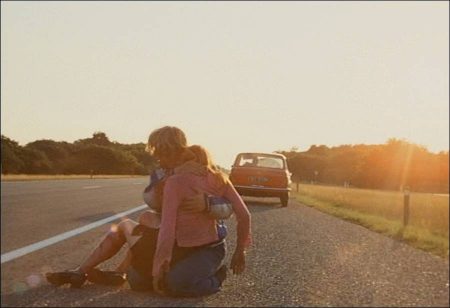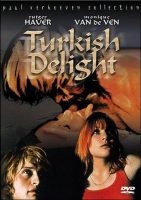Taglines: This is the indulgence of passion.
Turkish Delight movie storyline. Sort of a cross between Love Story (1970) and an earthy Rembrandt painting, this movie stars Rutger Hauer as gifted Dutch sculptor Eric, who has a stormy, erotic, and star-crossed romance with a beautiful young girl. The story follows the arc of their relationship and his interaction with her family.
Told in flashback form, initially, Eric is seen as a libertine lothario collector, taking trophies from his sexual conquests and pasting them in a book. He sees a sculpture he made of his lost lover and goes into a flashback of his relationship with his wife. He meets the girl, falls in love with and marries her, and we meet her parents: a charming, well meaning, bumbling father, and his shrew of a wife, who’s convinced Eric is too much of a bohemian to make a good mate for her daughter.
Eventually, the petty jealousies, the sexual hijinks, and the climactic vomit scene prove to be too much for the marriage, and Eric and his lady separate. Flash forward several months, and Eric finds the girl back in The Netherlands after an American sojourn. Their reunion is short lived. The somewhat melodramatic ending mirrors Love Story (1970).

Turkish Delight (Dutch: Turks fruit) is a 1973 Dutch film directed by Paul Verhoeven and filmed by Jan de Bont. The film is a love story of an artist and a young woman, starring Rutger Hauer in his film debut and Monique van de Ven. The story is based on the novel Turks fruit by Jan Wolkers.
Turkish Delight is the most successful film in the history of Dutch cinema. The film was a massive success at the Dutch box office: according to Alle Record, 3,338,000 people saw the film, while the Netherlands Film Festival puts it at 3.5 million, corresponding to about 26% of the population of the Netherlands at the time.
In 1973 it was nominated for an Academy Award for Best Foreign Language Film and in 1999 it received a special Golden Calf Award for Best Dutch Film of the Century. It was entered into the Canon of Dutch Cinema in 2007. In 2005 a musical version of Turks fruit was made starring Antonie Kamerling and Jelka van Houten.
Film Review for Turkish Delight
It begins with an epigraph from Tintin, in which two villains argue over who is “wickeder”, then opens proper with an unnamed narrator masturbating over nude photos of his departed lover, Olga, and rereading her old letters: “While I’m writing this to you my cunt is making sucking motions, like a baby’s mouth,” reads one. This mixture of sexual candour, uncomfortable analogies and theatrical villainy sets the tone for Jan Wolkers’ Turkish Delight, a Dutch classic about a bohemian sculptor’s obsessive relationship – a new translation of which is about to be published by Tin House Books.
In the age of the internet, lines like “dry cunts with warts inside. Nasty to the touch but nice on the dick,” or “I LOVE YOU SO MUCH, DON’T WIPE YOUR ASS, I’LL LICK YOU CLEAN” may not seem so shocking (they certainly aren’t in the Netherlands, where Turkish Delight is on the school syllabus). There’s even a musical of it. Perhaps more surprising is that these sentiments weren’t that shocking to the Dutch in 1969, when the book was first published. This may be because the picaresque novel of sexual tall tales I, Jan Cremer – by the eponymous author – had already caused enough outrage in the Netherlands five years earlier.
Although Turkish Delight was mostly praised by critics, Wolkers was attacked for his style: his coarse prose, use of slang, lack of paragraphs. And his beginning sentences with “And”. He tried to capture the way people actually spoke at a time when cultural challenges to authority were being reflected in the Dutch language: according to essayist Cyrille Offermans, the distinctions between “u” and “jij”, the formal and informal ways of addressing someone in Dutch, had by then practically evaporated. His book was, despite being set in the 50s, considered more a reflection of a liberated Amsterdam than something instigating said liberation. Then came the film.
Released in 1973, Turkish Delight the movie was a phenomenon: more than a quarter of the Dutch went to see it. In 1999, it was deemed the country’s “film of the century”. More impressive still is that, for many Dutch citizens to this day, it remains impossible to hear Strauss’s Radetzky March without imagining Olga’s father singing “tieten kont” – roughly “tits and ass” – over it. The film, with its many nude scenes, did cause uproar and, retroactively, made its source material controversial too.
Many women’s groups protested against the film and the book’s presentation of women remains disturbing. Apart from Olga, they are sex objects to help the narrator get over losing her. Amid his uncomfortably captivating bravado, there are moments of strange tenderness. “Even if I had pieced together a harem from all those bits of Olga,” he says, describing body parts of hers that he recognises in other women, “I still couldn’t have puzzled together her whole being”. But later on, he rapes her while she is sleeping.
I wanted to discuss the rape in detail, but cannot quote it without, somehow, feeling complicit. I assume we’re meant to despise the protagonist here. And I’ve tried and tried to read something meaningful into this scene. Something about how liberty requires you to respect another’s liberty, or else descend into violence. But every time I do, I’m turning a rape into a symbol.
It is, in fact, Olga’s frankness, not the narrator’s, that retains some positive, transgressive power. Her joking description of period-sex as a “blood wedding”, her assertive delight in anal sex, her disdain at having a child; this is a woman freed from the sexual hangups of her parents’ generation. But much of her behaviour is linked back – admittedly with elegant, symbolic foreshadowing – to childhood traumas, suggesting she is not in control of her own actions.
The new translation by Sam Garrett reads wonderfully. The book remains as compelling as it is off-putting; I constantly found myself admiring how Wolkers expressed something, rather than what was being expressed. But for a modern reader, Turkish Delight is more troubling than shocking. It is often called the Dutch Tropic of Cancer, but Lolita may be a more apt comparison – not in terms of subject, but as a lesson in the dangerous seduction of aesthetics. Lolita can you make laugh about, and even sympathise with, a paedophile. I’ve just spent an entire article discussing the eloquence of a rapist.
Turkish Delight (1973)
Directed by: Paul Verhoeven
Starring: Monique van de Ven, Rutger Hauer, Tonny Huurdeman, Wim van den Brink, Hans Boskamp, Dolf de Vries, Manfred de Graaf, Dick Scheffer, Marjol Flore, Bert Dijkstra, Suze Broks
Screenplay by: Monique van de Ven, Rutger Hauer
Production Design by: Jan André, Roland de Groot
Cinematography by: Jan de Bont
Film Editing by: Jan Bosdriesz
Costume Design by: Mia Houweling
Makeup Department: Bobby Eerhart
Music by: Rogier van Otterloo
MPAA Rating: None.
Distributed by: Nederland Film (Netherlands), Cinemation Industries (USA)
Release Date: February 22, 1973 (Netherlands), 27 September 1974 (USA)
Views: 381



